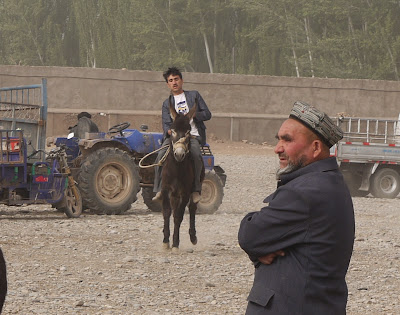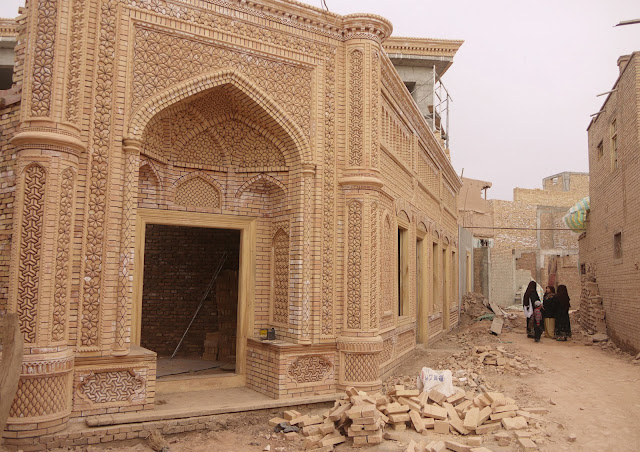Every Sunday, farmers from all over Kashgaria come to a place a bit outside of Kashgar, to trade their livestock. Kashgar's Sunday Market is the big event in the region, the place to be, to meet friends and other farmers, exchange news, buy a good sheep and sell your old donkey. So of course I was there already early in the morning.
The day started with a breakfast of noodles and tea:
Then the first farmers began to arrive.
At the entrance of the compound, a policeman collected a small fee from everyone.
Those already there sceptically scrutinized every newcomer.

Some of the newly arrived happily greeted old friends.
Then the trading began:
 Soon the place was bustling with activity.
Soon the place was bustling with activity.
Some people though were taking it easy.
In a corner, two old dudes were grinding scissors and knives, using a hand-driven grinding stone.
The day was hot and dusty, so that one had to take a rest from time to time.
However, Sunday is not only a busy day on Kashgar's cattle market. Also on the great bazar in the centre of the city, trading was in full swing. At the entrance of the bazar, this guy was selling all kinds of necessary reptiles, snakes and turtles.

Then I fell into the hands of a hat-seller. He fiercly argued that mid-May is the best time to buy a warm hat, as prices are low and the next cold winter will come for sure.
So I had a try. Here we see the traditional Uyghur model.
Then I tried this woollen cone. The wool was very nice, but it left the ears unprotected.
This one was better. But a bit narrow.
If one was to join a group of fierce mountain-rebels, this version would be the thing to wear.
This one was soft and warm, if slightly shapeless.
Designwise, the last model I tried was unrivalled.
Still, I finally decided to postpone the purchase of a hat until later in the year, as temperatures outside were already around 30 C, and the need for a warm hat seemed not that urgent.
Soon afterwards, I came to the stand of a knife-seller.
The Uyghurs are famous for their hand-made knives all across Central Asia, and it is true that the knives he sold were all very beautiful and reasonably priced. Unfortunately, it's almost impossible to bring them out of China, as carrying a knife in your luggage as well as sending it by post is forbidden by law.
Shortly afterwards, I met another knife-grinder. Unlike with the two dudes on the cattle market in the morning, his grinding stone was powered by the engine of his motorcycle (also note the protective glasses - this guy was evidently a master of his trade).
Finally, I called it a day and went home to the place I had rented in the old city. On the way, I met these two girls, who were teaching their little sister how to walk:
The day started with a breakfast of noodles and tea:
Then the first farmers began to arrive.
At the entrance of the compound, a policeman collected a small fee from everyone.
Those already there sceptically scrutinized every newcomer.

Some of the newly arrived happily greeted old friends.
Then the trading began:
 Soon the place was bustling with activity.
Soon the place was bustling with activity.Some people though were taking it easy.
The day was hot and dusty, so that one had to take a rest from time to time.

So I had a try. Here we see the traditional Uyghur model.
Then I tried this woollen cone. The wool was very nice, but it left the ears unprotected.
This one was better. But a bit narrow.
If one was to join a group of fierce mountain-rebels, this version would be the thing to wear.
This one was soft and warm, if slightly shapeless.
Designwise, the last model I tried was unrivalled.
Still, I finally decided to postpone the purchase of a hat until later in the year, as temperatures outside were already around 30 C, and the need for a warm hat seemed not that urgent.
Soon afterwards, I came to the stand of a knife-seller.
The Uyghurs are famous for their hand-made knives all across Central Asia, and it is true that the knives he sold were all very beautiful and reasonably priced. Unfortunately, it's almost impossible to bring them out of China, as carrying a knife in your luggage as well as sending it by post is forbidden by law.
Shortly afterwards, I met another knife-grinder. Unlike with the two dudes on the cattle market in the morning, his grinding stone was powered by the engine of his motorcycle (also note the protective glasses - this guy was evidently a master of his trade).
The bazar was a place where one could buy many things. Apart from the usual spices, shoes and clothes, a huge choice of perfumed toilet paper was on offer, as well as good Paknur fridges from Pakistan.
Finally, I called it a day and went home to the place I had rented in the old city. On the way, I met these two girls, who were teaching their little sister how to walk:











































































